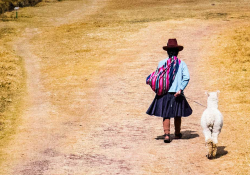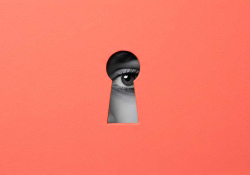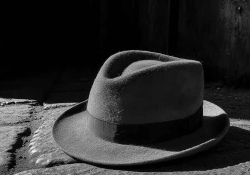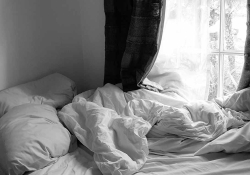The Most Beautiful House in the Neighborhood

After renting a room in an Indian family’s house in England, the Croatian tenant becomes privy to one member’s dreams of return.
“This is it!”
Parvati, a young Indian woman, shows me a tiny room with scarcely space for a bed, a chest-of-drawers, and a chair. The place is so small we can barely both fit in it. The walls are covered in scruffy wallpaper, moisture has accumulated near the windows, and the curtains smell of dust. So, the room is minute, the house is neglected, the street is nondescript, and it is a long way from the city center. They told me it is known as Little Asia. It’s not ideal, but I don’t have a lot of money. I moved to England two weeks ago and urgently need a place to lay my head. Parvati is charging a reasonable rent, and I don’t need much. Also, I like her family. Her husband, Arjun, and two sons with big brown eyes greeted me excitedly when I entered the house.
“I’ll take it!” I nod.
Parvati claps her hands joyfully and then steps to the window and opens the curtains.
“And here is the garden,” she says timidly.
I peep out of the window. Before my eyes emerges a typical English backyard, only this one is entirely overgrown and unkempt. You can barely see to the fence, it is so overrun with ivy. The roof of the garden-shed has collapsed, the walls are higgledy-piggledy, and it looks as if the whole lot is about to collapse. Potted plants, rain-soaked toys, discarded tools, and even a long-abandoned barbecue are strewn everywhere.
Parvati notices my frown and she tut-tuts, partly to herself. “I know the garden is a mess, but we’re only here for a short time, so it’s no use in planting flowers.”
* * *
Parvati works a lot; she is a nurse. The whole neighborhood is full of the same story: young Indian women who moved with their families to England to fill hospital quotas. Nurses from India are well known for their diligence and kindness, and Parvati is just like that. She offers me sweet cardamom tea and shows me the rest of the house. Along the way, she picks up the toys and angrily mutters under her breath that she should have given birth to a daughter to help her, not two sons who leave everything behind them and who will sit idly on their bottoms all day if you let them. The living room smells of Indian sticks and coconut oil, and where the fireplace once stood is an altar with a large statue of Lord Shiva and an image of Krishna, the blue-skinned god with a flute in his hand. Among the rest of this pantheon is a figurine of Parvati, the divine mother, and the image of the apelike Hanuman. There is a large, framed image of Ganesha, an elephant-headed god and other Hindu deities that I cannot recognize.
“Ganesha: I placed him here when we moved in, it was our new beginning,” Parvati explains.
I ask her how long they have been here.
“It will be the ninth year soon. I never thought we would stay that long. But this is where my sons were born, where they go to school. They talk like little Englishmen. When we go home, Grandma doesn’t understand them.”
When she says home, she means her hometown, the village of Pala in southern India. She shows me photos full of greenery on her cell phone; pineapple, rubber, and banana plantations. She asks me where my house is and, when I say Croatia, the former Yugoslavia, she nods in recognition.
“Tito and Nehru were friends,” she adds with a wink.
I’m laughing. I was born just as Yugoslavia was falling apart.
I was born just as Yugoslavia was falling apart.
* * *
The next day I move into my upstairs room. I only have one big suitcase and some books that I arrange next to the bed. I spend my days in the theater, and when I get out of the black box, it is already dark outside. I take a long bus ride to Little Asia, buy groceries in an Indian corner shop, and avoid the men gathered around the barbershop. When I finally get home, Parvati is still at work. Arjun prepares food in the kitchen: various curries, rice, parotta, appam. Over time, he has become the King of the Kitchen, joking that in India it is a woman’s job, but not in England. With the help of YouTube, he has mastered the intricacies and subtleties of Indian cuisine.
Arjun works in a bookstore at the nearby airport; he doesn’t earn much, Parvati is the one who brings money to the table. She does night shifts, works on bank holidays and during Christmas. They live modestly and for a simple reason. Every first of the month, they send a good portion of their earnings to India.
“We don’t like India!” says Achu, the older boy.
“It’s too hot there,” Kichu explains.
“And no cartoons,” adds Kichu with a grimace.
“It’s impossible. There are cartoons everywhere.” I am trying to help Arjun, who looks lost.
The boys moan.
“No, they are not our cartoons,” Kichu growls, emphasizing our. Arjun shrugs sadly.
They go to India once a year, but due to the high cost of plane tickets, school obligations, and work, their visits are getting shorter. They see family on Skype. Achu and Kichu play football, love fish and chips, wear school uniforms with ties, and go for after-school tutoring sessions.
“It’s because dad doesn’t know anything,” Kichu whispers.
Their task tonight is in English. Write the following words: difficult, heritage, improbable, abbreviate.
When Parvati returns from work, she first takes a long bath.
“I can’t stand the smell of the hospital,” she says.
She scrapes her cracked heels with a stone and smears cream on her hands that are dry from wearing plastic gloves.
Achu and Kichu don’t understand what my job is; I clumsily try to explain what theater is.
“It is a place for acting.”
“And what is acting?”
“Acting is when you pretend, fantasize, invent things.”
“You mean, you’re lying?”
I’m sweating. I promise to take them to the show one day, if for no other reason than to shut them up. I am very fond of them, but they get under my skin with their begging for sweets, failed attempts to tell a joke, and questions that always surprise me.
* * *
On Saturdays, Parvati comes home early in the morning after the night shift. Arjun takes the boys to football so that Mum can sleep. But she only dozes off for twenty minutes and then starts cleaning the house. I see her armed with a vacuum cleaner, covering her mouth with a scarf.
“Carpets! I hate them. In India, we don’t have carpets!”
When she is done, she makes herself tea, then sits down and counts something in a small notebook.
“A little bit longer, just a little bit longer,” she mutters to herself.
Then she looks toward the overgrown garden, sighs profoundly, and quickly draws the curtain to obscure the mess.
“Doesn’t matter, we’re only here temporarily anyway.”
The months alternate, spring brings rain, but also longer daylight. Summer in England is not bad at all; one could get used to it. I guard the house for two weeks while my Indian hosts go home. On their return, they bring me packs of cashews, banana chips, fried snacks, and sweets.
“Imagine what all my crazy husband packed in his suitcase!” Parvati laughs.
Arjun pulls out a few coconuts and a bag full of curry leaves.
“He loves his garden in India!” Parvati explains.
“Now the taste will be the right one.” Arjun defends himself and carefully packs the spice leaves into freezer bags.
* * *
I got used to this family. They became mine. I fit into their rhythm of day and night shifts, school bus arrivals and departures.
I got used to this family. They became mine.
One Saturday, after vacuuming and counting in a notebook, Parvati draws a line.
“Come here, I want to show you something,” she said, pulling my arm.
She goes to the altar with Hindu gods and pulls out a sheet of paper from behind a large picture of Ganesha.
“I printed this out at work today.”
She carefully holds a glossy photo. The photo shows a large house surrounded by greenery. In front of the entrance door, there is a terrace, on the first floor a large balcony. The windows are wide, rounded like a chapel, the roof is bright red, with small towers, white pillars everywhere—a royal villa.
“Wonderful!” I say, but I don’t understand why she is showing me the photo of some house.
“It has two bathrooms!” she says seriously, as if two bathrooms are a measure of luxury.
“We are building it—little by little. I still need money for the inside, and then we can go back.”
The house in the photo looks magnificent. And then I look around us; damp walls, torn wallpaper, poor heating. But Parvati does not care. She gently holds a photo of the house in her hand.
“This is our house.” A look of pride passes across her face. “The most beautiful house in the neighborhood.”
In her eyes, one can see all those overtime hours, all the night shifts, all the thriftiness that has accumulated and been sent back once a month to India.
I look at a photograph of a house with a red roof in India, and my thoughts lead me down unusual paths all the way to Slavonia and the summer months spent with my grandparents. They lived in the countryside, in a house with a small garden where my grandmother planted turnips, chard, carrots, peas; just a little bit of everything. There were also a few fruit trees and grape plants that covered the entrance to the garage. They never had a car, the garage was turned into a place for chickens, and once upon a time, Grandma kept goats as well. There was also a large bread oven made of stones and mud. Grandpa would make a fire, and my task was to peel the sweet corn. The corn was cooked in a large black cauldron, and when the fire turned the wood into embers and ashes, Grandma would spread it out and place the cabbage leaves on the warm bricks, on which she would then lay the soft, rolled bread. The style of cooking was ispod peke, under the metal lid. She would place a heavy metal lid above the bread and cover the lid with still-warm zeal. At the other end, in a round tray, she stacked meat, potatoes and zucchini, peppers and onions. It was all simmered for hours.
The style of cooking was ispod peke, under the metal lid.
My grandparents had little, but they knew how to enjoy themselves. Grandma always said that the happiest days of her life were right now.
In the evening, when the sun went down and the heat subsided, the neighbors would take to the streets. The adults would sit on benches in front of the houses, talking politics, gossiping, and discussing recipes. We kids would play hide-and-seek or gumi-gumi, jumping around a long plastic string, getting angry at any car that ruined the game with its passing.
Opposite Grandma’s house, there was a big white bench that no one ever sat on. Everyone knew it was the house of the Barišić family, and they called the house Barišička. It was the most beautiful house in the street, in fact not just the street, but the whole neighborhood. A two-story house with a wide gate, cream-colored façade, gilded locks, first-class carpentry, all of which contrasted with the surrounding houses. The Barišić family were on temporary work in Germany; they would come once a year when the plums and apples on the branches were already rotten and had fallen from the tree. For a week they would wash the windows, mow the grass, visit relatives, and distribute gifts, and then they would pull down the window blinds and return to Germany.
Grandma was good friends with Aunt Barišić who loved her baked bread.
“Heavenly taste, it melts in your mouth,” she muttered contentedly. She would bring me a real Barbie doll from Germany each time as a thank-you.
“One more year, a little more and we are back,” she explained, gulping down my grandmother’s stuffed peppers, pancakes with cream cheese, and walnut cakes. She packed sausages, jars of ajvar, and homemade apricot jam in her basket. On the way out, she would hug my grandmother, look around and say, “You know how to enjoy it. Life passes before one notices. Just one more year and I will enjoy it too.”
Years passed, but the blinds on the windows of Barišička remained pulled down, and the white bench in front of the house lay empty.
* * *
“We don’t want to go there!” screams Achu, and he colored the word there with a disgusting grimace.
It is strange how the words there and home denote the same space.
It is strange how the words there and home denote the same space.
I lived in that rented little room upstairs for a full year. Time passes before one notices. The day I packed my things to go, I had a lump in my throat. It was hard for me to leave a family who almost became mine. I closed my bags, fixed the sheets on the bed once more, and checked to see if I had forgotten anything in the wardrobe. On the way out, I opened the curtains to let the light into the room.
From my window, I saw Parvati planting flowers in the back garden.
Translation from the Croatian
Editorial note: From Kiša u Indiji, ljeto u Berlinu (Zagreb: Disput, 2016), copyright © 2016 by Kristina Gavran.
















